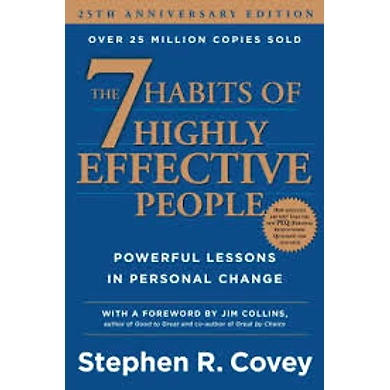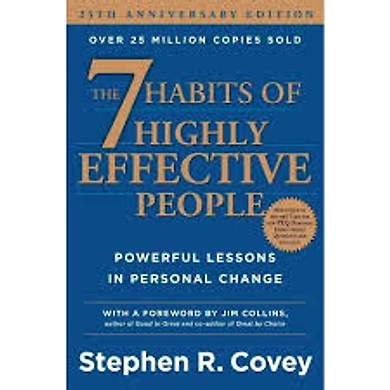yotpo
7 Habits Of Highly Effective People (English, Paperback, Covey Stephen R.)
-
Product is not available
- Price upon request
-
-+
-
About Book:
An ideal guide to building your personality by altering your habits It is rightly said that habits make or break a man. If you want to know why you are not doing something right, sometimes all you need is to perform an analysis of your habits and consider altering them. Because sometimes it is not about what you do, but more about how you do it! And that's where your habits play a very important role. 'The 7 habits of Highly Effective People' is a book that aims at providing its readers with the importance of character ethics and personality ethics. The author talks about the values of integrity, courage, a sense of justice and most importantly, honesty. The book is a discussion about the seven most essential habits that every individual must adopt to in order to live a life which is more fulfilling. Content of the book: The author continues to take the readers through the journey of character development. He elaborates how the development of the character of a being ranges from the time of his birth to the years until he grows independent. The first three habits demark the development one goes from dependence to independence. The next three habits describe in detail about interdependence while the final seventh habit deals with the new self, that is renewal. The book is highly recommended for people of all ages. It also holds a record of having over 25 million copies sold in about as many as 40 languages all over the world. About the Author: Stephen R Covey, the author of the book, is known to hold an MBA from the Harvard University. In his previous years of schooling, Covey also has studied Religious Education and Business Administration. It was in his doctoral thesis that Covey came across a contrast in the literature regarding self-help. His observations marked that the books post 1920 focused highly on personality traits while the ones before that focused on character development. That is when the author put forth his belief about how a balance between the two is more essential than the two in isolation. You can buy this book from Gycfast today by following a few easy steps.
Minimum Order Quantity1
-
Additional Information
The 7 Habits of Highly Effective People, first published in 1989, is a business and self-help book written by Stephen Covey.
Covey presents an approach to being effective in attaining goals by aligning oneself to what he calls "true north" principles based on a character ethic that he presents as universal and timeless.
Covey defines effectiveness as the balance of obtaining desirable results with caring for that which produces those results. He illustrates this by referring to the fable of the goose that laid the golden eggs. He further claims that effectiveness can be expressed in terms of the P/PC ratio, where P refers to getting desired results and PC is caring for that which produces the results.
Covey's best-known book, has sold more than 25 million copies worldwide since its first publication. The audio version became the first non-fiction audio-book in U.S. publishing history to sell more than one million copies. Covey argues against what he calls "the personality ethic", that he sees as prevalent in many modern self-help books. He promotes what he labels "the character ethic": aligning one's values with so-called universal and timeless principles. In doing this, Covey is deliberately and mindfully separating principles and values. He sees principles as external natural laws, while values remain internal and subjective. Our values govern our behavior, while principles ultimately determine the consequences. Covey presents his teachings in a series of habits, manifesting as a progression from dependence through independence on to interdependence.
-
Reviews ()
Write a Review
The 7 Habits of Highly Effective People, first published in 1989, is a business and self-help book written by Stephen Covey.
Covey presents an approach to being effective in attaining goals by aligning oneself to what he calls "true north" principles based on a character ethic that he presents as universal and timeless.
Covey defines effectiveness as the balance of obtaining desirable results with caring for that which produces those results. He illustrates this by referring to the fable of the goose that laid the golden eggs. He further claims that effectiveness can be expressed in terms of the P/PC ratio, where P refers to getting desired results and PC is caring for that which produces the results.
Covey's best-known book, has sold more than 25 million copies worldwide since its first publication. The audio version became the first non-fiction audio-book in U.S. publishing history to sell more than one million copies. Covey argues against what he calls "the personality ethic", that he sees as prevalent in many modern self-help books. He promotes what he labels "the character ethic": aligning one's values with so-called universal and timeless principles. In doing this, Covey is deliberately and mindfully separating principles and values. He sees principles as external natural laws, while values remain internal and subjective. Our values govern our behavior, while principles ultimately determine the consequences. Covey presents his teachings in a series of habits, manifesting as a progression from dependence through independence on to interdependence.
Style changes
Get Quote
Download cart items as a formal quotation
-
Step 1:
Add items to the Cart
-
Step 2:
Go to My Cart Page
-
Step 3:
Download Quotation







